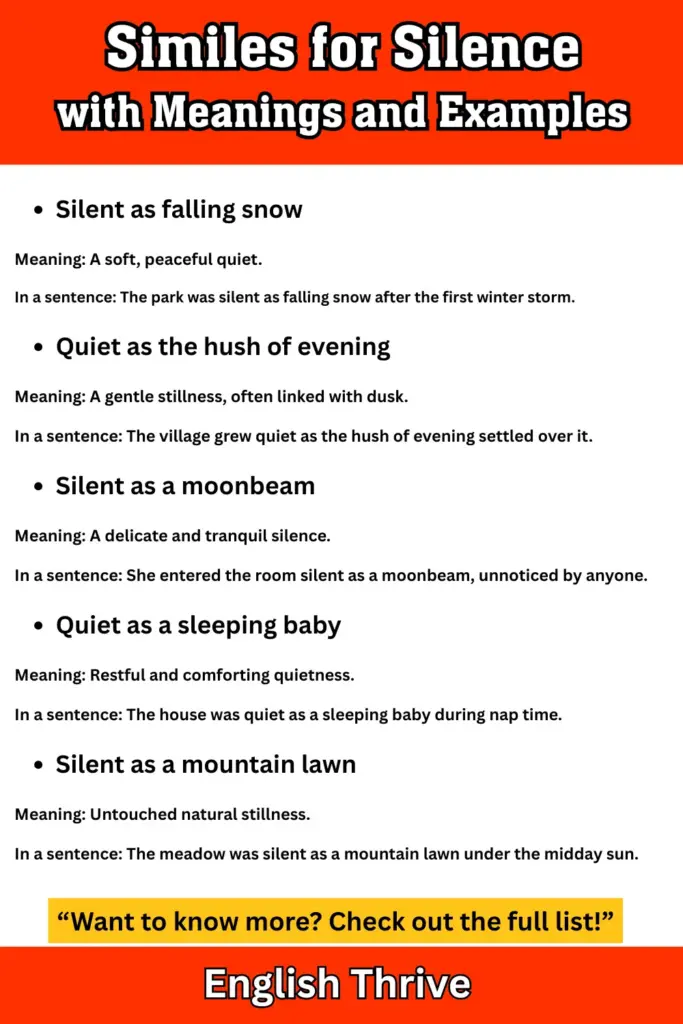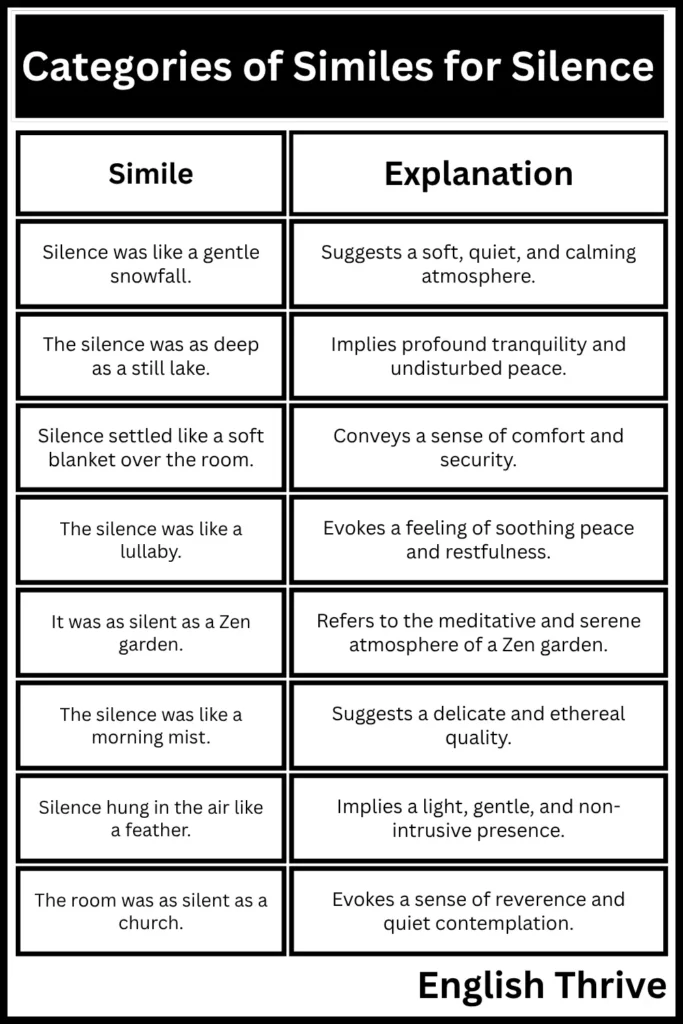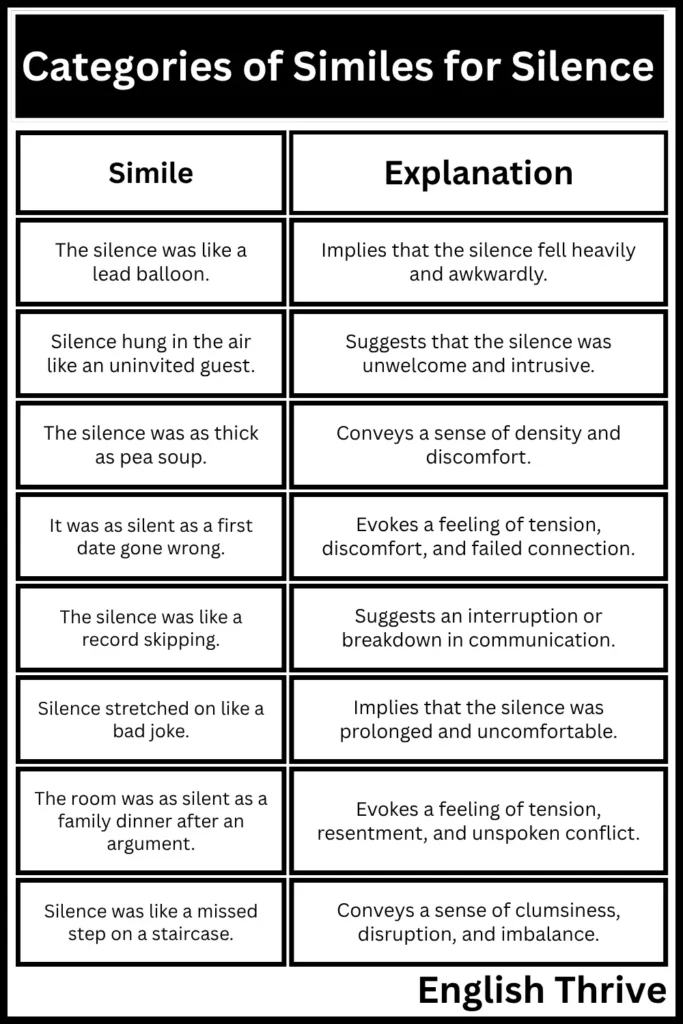Silence is powerful. It can feel peaceful, awkward, tense, or even overwhelming depending on the situation. Writers, poets, and everyday speakers often turn to similes to express these shades of quietness more vividly. A simile is a comparison using the words like or as, and it helps us create mental images that capture the essence of silence.
Think about it: “The room was silent as falling snow” feels different from “The room was silent as a grave.” Both convey quietness, but the emotional impact isn’t the same. That’s the beauty of similes—they paint silence in colors words alone sometimes cannot.
In this article, we’ll explore more than 40 similes for silence, categorized by mood and meaning, with examples you can use in your own writing. We’ll also look at famous literary references, practice exercises, and related idioms to make your English richer and more expressive.
Contents
ToggleWhat Are Similes and Why Use Them for Silence?
A simile is a figure of speech that compares two different things using “like” or “as.” For example:
- “The night was as quiet as a whisper.”
- “The room was silent like a statue.”
Both sentences compare silence to something familiar, which makes the description more vivid and relatable.
Silence is one of the most commonly described concepts in literature and daily speech because it can carry so much emotional weight. By using similes, we can capture different types of quietness—whether it’s the calm of a snowy evening, the awkward stillness in a conversation, or the heavy hush of grief.
List of Similes for Silence with Meanings and Examples
Silence isn’t one-size-fits-all—it can be peaceful, tense, heavy, or natural. Below are similes organized into categories, each with meanings and example sentences.
Serene or Peaceful Silence
These similes highlight silence as calming, restful, or beautiful.
- Silent as falling snow
Meaning: A soft, peaceful quiet.
In a sentence: The park was silent as falling snow after the first winter storm. - Quiet as the hush of evening
Meaning: A gentle stillness, often linked with dusk.
In a sentence: The village grew quiet as the hush of evening settled over it. - Silent as a moonbeam
Meaning: A delicate and tranquil silence.
In a sentence: She entered the room silent as a moonbeam, unnoticed by anyone. - Quiet as a sleeping baby
Meaning: Restful and comforting quietness.
In a sentence: The house was quiet as a sleeping baby during nap time. - Silent as a mountain lawn
Meaning: Untouched natural stillness.
In a sentence: The meadow was silent as a mountain lawn under the midday sun. - Quiet as the tranquil sky
Meaning: A serene, boundless silence.
In a sentence: The lake was quiet as the tranquil sky above it.
Awkward or Tense Silence
These similes show silence that feels stiff, uneasy, or uncomfortable.
- Quiet as a stone
Meaning: Lifeless or unresponsive silence.
In a sentence: He sat quiet as a stone after hearing the shocking news. - Silent as a statue
Meaning: Motionless, frozen quiet.
In a sentence: The children stood silent as statues when the teacher caught them. - Quiet as a sepulchre
Meaning: Silence associated with eerie stillness.
In a sentence: The old chapel was quiet as a sepulchre, giving me chills. - Silent as a picture
Meaning: Still, frozen in time.
In a sentence: She remained silent as a picture while the argument unfolded.
Heavy or Oppressive Silence
These similes carry a darker, weightier feeling of silence.
- Quiet as death
Meaning: Absolute, unsettling silence.
In a sentence: The battlefield was quiet as death after the fighting stopped. - Silent as the grave
Meaning: Deep, final stillness.
In a sentence: The room was silent as the grave once the lights went out. - Silent as despair
Meaning: Silence full of sadness or hopelessness.
In a sentence: He sat alone, silent as despair, after the loss. - Quiet as a tomb
Meaning: Deathlike silence, eerie and solemn.
In a sentence: The basement was quiet as a tomb at midnight.
Natural, Untouched Silence
These similes connect silence to nature and landscapes.
- Silent as a standing pool
Meaning: Still, unmoving quietness.
In a sentence: The swamp was silent as a standing pool beneath the mist. - Quiet as dreaming trees
Meaning: A natural, gentle silence.
In a sentence: The forest was quiet as dreaming trees under the moonlight. - Silent as a sleeping cloud
Meaning: Silence soft and unnoticeable.
In a sentence: Her presence was silent as a sleeping cloud drifting above. - Quiet as the desert
Meaning: Vast, endless silence.
In a sentence: The desert was quiet as eternity, stretching into the horizon. - Noiseless as a shadow
Meaning: Subtle, unnoticed quietness.
In a sentence: He moved noiseless as a shadow through the dark hallways.
Famous Similes for Silence in Literature & Poetry
Writers and poets have always used silence as a powerful theme. By comparing it with nature, death, or stillness, they capture emotions words alone cannot express.
- Shakespeare often used silence to show tension or deep thought. Phrases like “silent as night” appear in plays to emphasize mystery or stillness.
- Poetry frequently draws on silence as imagery: “silent as falling snow” evokes peace, while “silent as the grave” signals finality.
- Modern storytelling uses silence similes in thrillers (to show suspense), romance (to show intimacy), and drama (to show grief).
These literary uses remind us that silence can be as expressive as speech—sometimes even more.
Exercises to Practice Using Similes for Silence
Try these simple activities to strengthen your understanding:
- The room was as ______ as a ______ when the teacher entered.
- After the storm passed, the neighborhood was as ______ as a ______.
- The forest was as ______ as a ______ as we tiptoed through the trees.
- The classroom was as ______ as a ______ during the test.
- Despite asking multiple times, she remained as ______ as a ______ about her plans.
Suggested answers: mouse, vacuum, ghost, church, closed book.
Expressions and Idioms About Silence
Similes are just one way to describe quietness. Here are some idioms and phrases with similar meanings:
- “Pin drop silence” – so quiet you could hear the drop of a pin.
- “Deafening silence” – silence that feels heavy or overwhelming.
- “Stone-cold silence” – complete lack of response, often unfriendly.
FAQs about Similes for Silence
Q1: What are some common similes for silence?
Some popular ones include quiet as a mouse, silent as the grave, quiet as a tomb, silent as falling snow, and quiet as the desert.
Q2: What does “silent as the grave” mean?
It describes an absolute, eerie, and complete silence, often associated with death or finality.
Q3: Is “quiet as a mouse” a simile or idiom?
It’s both—a simile (because it uses “as”) and also commonly used as an idiom in English.
Q4: How do writers use similes to describe silence?
They use them to set mood, build atmosphere, and help readers imagine the scene more vividly.
Q5: What’s the difference between similes and metaphors for silence?
- A simile uses like or as → “Silent as a statue.”
- A metaphor directly equates → “The statue of silence stood between them.
Conclusion
Similes for silence give us creative ways to describe one of life’s most powerful experiences: quietness. Whether peaceful like falling snow, heavy like the grave, or awkward like a statue, these comparisons bring writing to life.
By practicing similes and using them in everyday speech or creative writing, you’ll find your descriptions richer, more expressive, and easier for readers to imagine. Silence, after all, speaks volumes—especially when described with the right simile.




